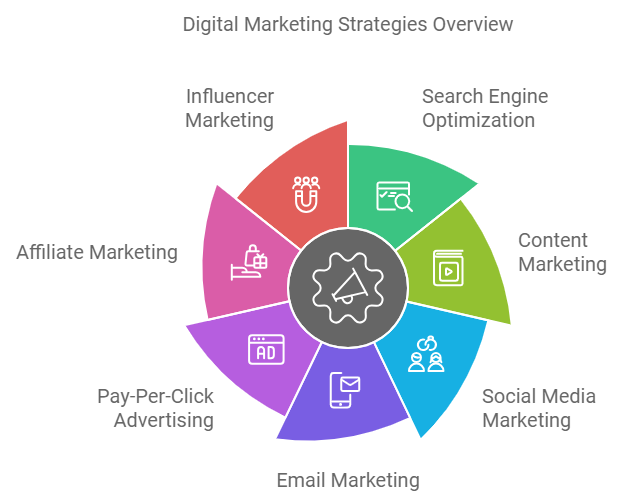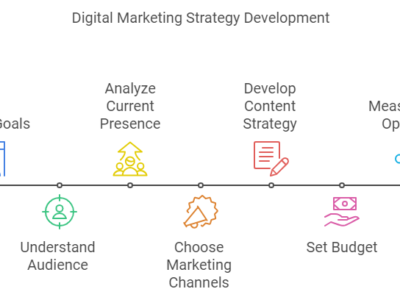
In today’s technology-driven world, digital marketing has become an essential component of business strategy. The rapid growth of the internet and digital platforms has transformed how companies interact with their customers, making it crucial to understand the vast scope of digital marketing. This blog post will explore the various elements of digital marketing, the opportunities they present, and how businesses can leverage these strategies for growth.
Understanding Digital Marketing
Digital marketing encompasses all marketing efforts that use the internet or electronic devices. It includes a range of strategies and channels that businesses can utilize to connect with their audience, promote their products or services, and drive conversions. The primary goal of digital marketing is to reach potential customers through relevant and engaging content, ultimately guiding them through the buyer’s journey.
Read More: Scope of Digital Marketing
Key Components of Digital Marketing

Key Components of Digital Marketing
- Search Engine Optimization (SEO)
SEO is the practice of optimizing your website and content to improve its visibility on search engines like Google. By using targeted keywords, creating high-quality content, and ensuring a user-friendly website, businesses can attract organic traffic and enhance their online presence. - Content Marketing
Content marketing involves creating and sharing valuable content to attract and engage a specific audience. This can include blog posts, videos, infographics, and podcasts. The goal is to provide useful information that addresses customer needs, establishing your brand as an authority in your industry. - Social Media Marketing
Social media platforms like Facebook, Instagram, Twitter, and LinkedIn offer businesses a way to connect with their audience in real time. By sharing engaging content and interacting with followers, companies can build brand awareness, foster community, and drive traffic to their websites. - Email Marketing
Email marketing remains one of the most effective digital marketing strategies. By sending targeted messages to subscribers, businesses can nurture leads, promote products, and keep customers informed about new offerings. Personalization and segmentation are key to maximizing engagement and conversion rates. - Pay-Per-Click (PPC) Advertising
PPC advertising allows businesses to place ads on search engines and social media platforms, paying only when users click on their ads. This method provides immediate visibility and can drive targeted traffic to your website, making it an effective strategy for generating leads quickly. - Affiliate Marketing
Affiliate marketing involves partnering with other businesses or influencers to promote your products in exchange for a commission on sales. This strategy can expand your reach and tap into new audiences while leveraging the credibility of your partners. - Influencer Marketing
Influencer marketing focuses on collaborating with individuals who have a strong following on social media. By partnering with influencers relevant to your industry, you can reach their audience and build trust more effectively than through traditional advertising.
The Benefits of Digital Marketing
The scope of digital marketing offers numerous benefits for businesses:
- Targeted Reach: Digital marketing allows you to target specific demographics, ensuring that your message reaches the right audience.
- Cost-Effectiveness: Many digital marketing strategies, such as social media and content marketing, can be more affordable than traditional advertising methods.
- Measurable Results: Digital marketing provides robust analytics and reporting tools that allow you to track the performance of your campaigns in real time.
- Flexibility and Adaptability: With the ability to adjust strategies quickly based on data insights, businesses can respond to market changes and customer preferences more effectively.
Conclusion
The scope of digital marketing is vast and continually evolving, offering businesses countless opportunities for growth and engagement. By understanding and implementing various digital marketing strategies—such as SEO, content marketing, social media, and email marketing—companies can build a robust online presence and connect with their audience more effectively. As technology advances, staying informed about new trends and tools will be essential for businesses looking to thrive in the digital landscape. Embrace the opportunities digital marketing presents, and position your business for long-term success.
Related:
FAQs About the Scope of Digital Marketing
1. What is digital marketing?
Digital marketing encompasses all marketing efforts that use the internet or electronic devices to reach potential customers. It includes various strategies such as SEO, content marketing, social media marketing, email marketing, and more.
2. Why is digital marketing important for businesses?
Digital marketing is crucial because it allows businesses to reach a wider audience, engage with customers in real time, and measure the effectiveness of their marketing campaigns. It also provides cost-effective solutions compared to traditional marketing methods.
3. What are the key components of digital marketing?
The key components include:
- Search Engine Optimization (SEO)
- Content Marketing
- Social Media Marketing
- Email Marketing
- Pay-Per-Click (PPC) Advertising
- Affiliate Marketing
- Influencer Marketing
4. How can businesses measure the success of their digital marketing efforts?
Businesses can measure success through various analytics tools that track key performance indicators (KPIs) such as website traffic, conversion rates, engagement rates, and ROI. These metrics provide insights into what strategies are working and where improvements are needed.
5. What is the difference between inbound and outbound marketing?
Inbound marketing focuses on attracting customers through valuable content and engagement, while outbound marketing involves pushing messages to a broader audience through traditional methods like cold calling and print ads. Digital marketing typically emphasizes inbound techniques.
6. How can small businesses benefit from digital marketing?
Small businesses can leverage digital marketing to reach targeted audiences at a lower cost, enhance brand visibility, and compete effectively with larger companies. Strategies like social media marketing and content creation can help build a strong online presence without significant investment.









